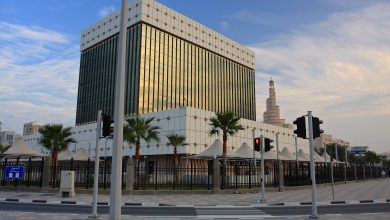
Qatar keen to protect rights of persons with disabilities
قطر حريصة على تنفيذ التزاماتها نحو اتفاقية حقوق ذوي الإعاقة
New York: Qatar stressed its keenness on continuing to implement its obligations towards the Convention on the Rights of Persons with Disabilities, noting that it spares no effort to foster, protect, empower and integrate persons with disabilities at the national and international levels.
This came in Qatar’s statement delivered by H E Ambassador Sheikha Alia Ahmed bin Saif Al Thani, the Permanent Representative of Qatar to the United Nations, at the 11th session of the Conference of States Parties to the Convention on the Rights of Persons with Disabilities, which began on Tuesday at the UN headquarters.
Her Excellency said that Qatar was among the first States to ratify the Convention on the Rights of Persons with Disabilities in 2008. Since then, Qatar has made great strides in achieving and embedding the principles and foundation of Qatar’s National Vision 2030, including achieving equality and justice for all groups and sectors of society, including persons with disabilities.
She added that the State of Qatar has made continuous efforts to promote the rights of persons with disabilities in terms of addressing their rights and issues in detail in the relevant legislation and laws and providing resources necessary for implementation at the executive level in various fields (education, health care, employment, adequate housing and access to public and private facilities as well as cultural and sports facilities, etc.), ensuring that they are not left behind by the rapid development of the State of Qatar.
The Ambassador noted many plans and strategies for persons with disabilities adopted by Qatar, most recently the National Autism Plan 2017-2021 to improve the lives of people with autism.
“We are proud that the State of Qatar is now considered to be among the developed countries in the field of care for persons with disabilities. Qatar currently has 34 specialized bodies that offer specialized services for people with disabilities.”
She added that Qatar believes in the importance of investing in information and communication technology to unlock the potential of people with disabilities and help them achieve independence and self-reliance. For this purpose, it launched the Digital Inclusion Strategy and the Mada Assistive Technology Center, which is working hard to help people with disabilities to attain their goals and access to equal opportunities in education and work so that they can live independently.
In this context, HE the Ambassador referred to Gulf Region Education Assistive Technology (GREAT) organized by the Mada Center in April 2018 under the auspices of the Ministry of Transport and Communications, in cooperation with the Ministry of Education, Hamad Bin Khalifa University and the US Assistive Technology Industry Association.
The survey provided info on the needs of persons with disabilities, identified types of disabilities in the State, and provided analysis of data and data collected in order to promote integration within society, she added.
Concluding, the Ambassador stressed that Qatar is keen to continue to implement its obligations towards the Convention on the Rights of Persons with Disabilities and that it spares no effort to foster, protect, empower and integrate persons with disabilities at the national and international levels.
أكدت دولة قطر حرصها على الاستمرار بتنفيذ التزاماتها نحو اتفاقية حقوق الأشخاص ذوي الإعاقة، مشيرة إلى أنها لا تدخر أي جهد من أجل رعاية وحماية وتمكين وإدماج الأشخاص ذوي الإعاقة على المستوى الوطني والدولي. جاء ذلك في بيان دولة قطر الذي ألقته أمس سعادة السفيرة الشيخة علياء أحمد بن سيف آل ثاني، المندوب الدائم لدولة قطر لدى الأمم المتحدة في «الدورة الحادية عشرة لمؤتمر الدول الأطراف في اتفاقية حقوق الأشخاص ذوي الإعاقة»، التي بدأت أعمالها يوم الثلاثاء الماضي بمقر الأمم المتحدة في نيويورك.
أفادت سعادة السفيرة الشيخة علياء أحمد بن سيف آل ثاني، بأن دولة قطر كانت من أوائل الدول التي صادقت على اتفاقية حقوق الأشخاص ذوي الإعاقة في عام 2008، ومنذ ذلك الوقت قطعت الدولة شوطاً كبيراً نحو تحقيق وترسيخ المبادئ والأسس التي تقوم عليها الرؤية الوطنية 2030 لدولة قطر، بما فيها تحقيق المساواة والعدالة لجميع فئات وقطاعات المجتمع ومنهم الأشخاص ذوي الإعاقة.
وتابعت: إن دولة قطر قد بذلت جهوداً متواصلة للنهوض بالأشخاص ذوي الإعاقة من حيث تناول حقوقهم وقضاياهم بشكل مفصل في التشريعات والقوانين ذات الصلة، وتوفير الموارد اللازمة للتطبيق على المستوى التنفيذي في مختلف المجالات (التعليمية، والرعاية الصحية، والعمل، والمسكن المناسب، والوصول إلى المرافق العامة والخاصة، والثقافة والرياضة وغيرها)، وبما يضمن عدم تركهم يتخلفون عن ركب التنمية المتسارع في دولة قطر.
وأشارت سعادة السفيرة إلى العديد من الخطط والاستراتيجيات المعنية بالأشخاص ذوي الإعاقة، التي أقرتها دولة قطر، والتي كان آخرها الخطة الوطنية للتوحد 2017-2021، لتحسين سبل حياة الأشخاص المصابين بالتوحد وأسرهم.
وقالت سعادتها إنه من دواعي فخرنا بأن دولة قطر باتت تعتبر الآن في مصاف الدول المتقدمة في مجال رعاية الأشخاص ذوي الإعاقة، حيث توجد في دولة قطر حالياً 34 جهة متخصصة تقدم خدماتها التخصصية لذوي الإعاقة بمختلف إعاقاتهم.
وأضافت أن دولة قطر تؤمن بأهمية استثمار تكنولوجيا المعلومات والاتصال في مجال إطلاق القدرات الكامنة للأشخاص ذوي الإعاقة ومساعدتهم من أجل تحقيق الاستقلالية والاعتماد على الذات، حيث تم إطلاق استراتيجية الشمولية الرقمية، وتأسيس مركز (مدى) للتكنولوجيا المساعدة الذي يقوم بجهد كبير لمساعدة الأشخاص ذوي الإعاقة لتحقيق أهدافهم وحصولهم على فرص متكافئة في التعليم والعمل بما يمكنهم من العيش باستقلالية.
وفي هذا السياق، أشارت سعادة السفيرة إلى المؤتمر التعليمي للتكنولوجيا المساعدة لمنطقة الخليج GREAT 2018 الذي نظمه مركز «مدى» في شهر أبريل 2018 تحت رعاية وزارة المواصلات والاتصالات، وبالتعاون مع وزارة التعليم وجامعة حمد بن خليفة وجمعية صناعة التكنولوجيا المساعدة في الولايات المتحدة.
وأفادت سعادتها بأن المؤسسات القطرية العاملة مع الأشخاص ذوي الإعاقة تستند في جهودها وخططها لدمج ذوي الإعاقة في المجتمع إلى بيانات ميدانية مسحية دقيقة، تجري بين فترة وأخرى، مشيرة إلى المسح النموذجي للإعاقة الذي نفذته وزارة التخطيط التنموي والإحصاء خلال شهر أكتوبر 2017 بالتعاون مع مركز قطر للتكنولوجيا المساعدة «مدى»، ومنظمة الصحة العالمية.
وفي ختام البيان، أكدت سعادة السفيرة الشيخة علياء أحمد بن سيف آل ثاني أن دولة قطر حريصة على الاستمرار بتنفيذ التزاماتها نحو اتفاقية حقوق الأشخاص ذوي الإعاقة، وبأنها لا تدخر أي جهد من أجل رعاية وحماية وتمكين وإدماج الأشخاص ذوي الإعاقة على المستوى الوطني والدولي، معربة عن تطلع دولة قطر للمشاركة بخبراتها في مجال حقوق الأشخاص ذوي الإعاقة في جميع المحافل والمؤتمرات المحلية والإقليمية والدولية.;



